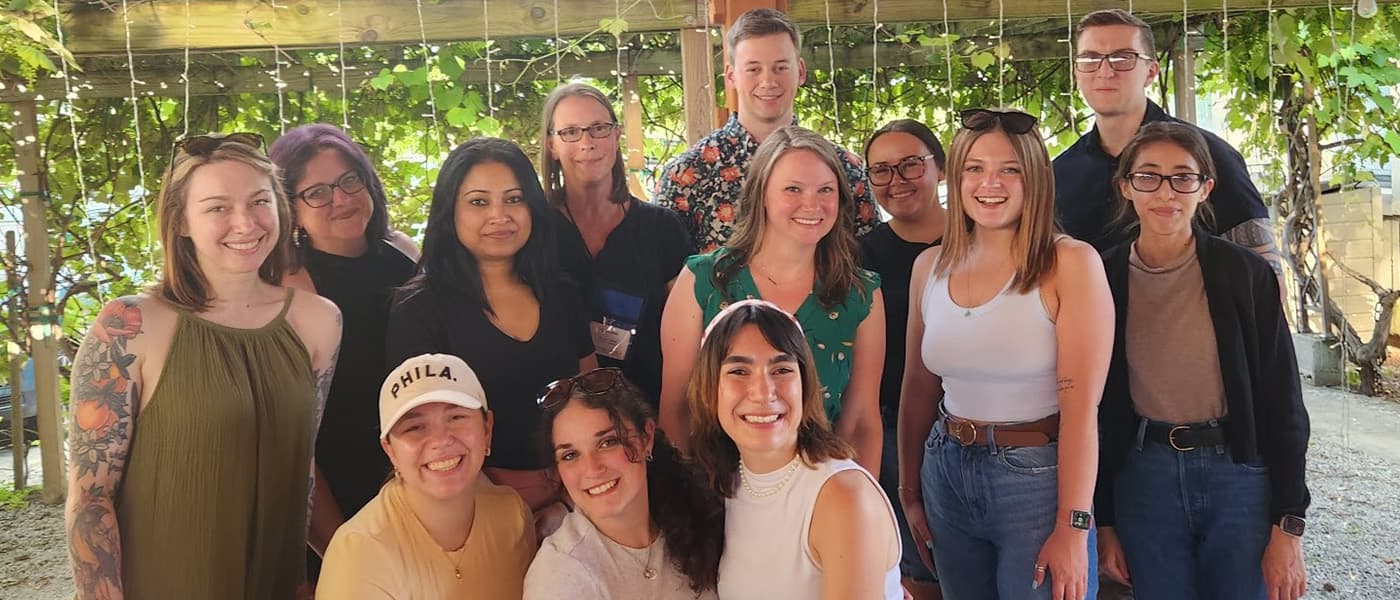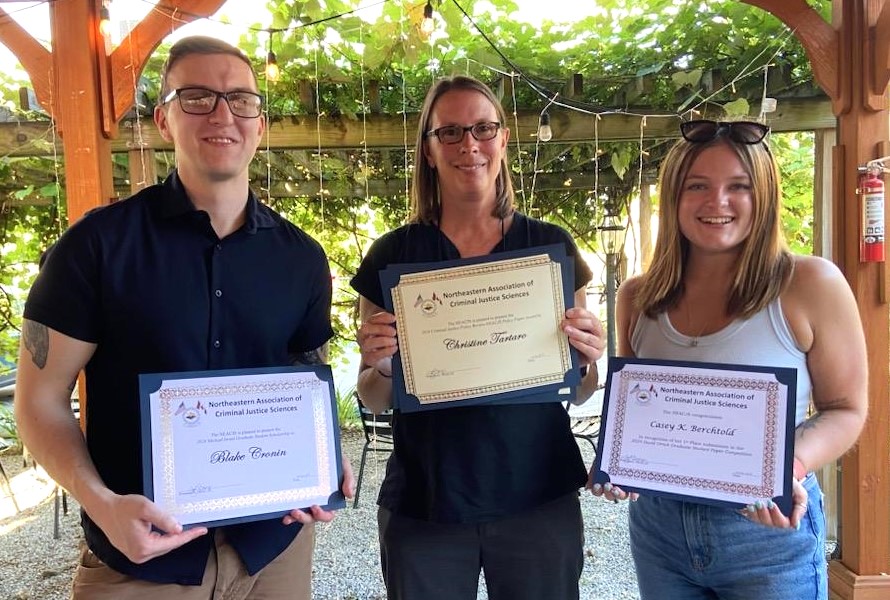Faculty, Students Win Awards at Criminal Justice Conference

Faculty and students recently attended the annual Northeastern Academy of Criminal Justice Sciences (NEACJS) Conference in Gettysburg, Pennsylvania.
Galloway, N.J. – Faculty and students recently attended the annual Northeastern Academy of Criminal Justice Sciences (NEACJS) Conference in Gettysburg, Pennsylvania, where several presented research and also won significant awards.

From left to right, Criminal Justice master’s student Blake Cronin; Christine Tartaro, distinguished professor of Criminal Justice; and recent graduate Casey Berchtold with their awards.
Criminal Justice master’s student Blake Cronin received the Michael Israel Graduate Student Scholarship, which is presented in honor of Mike Israel to recognize his contributions to public policy and criminal justice. The scholarship is awarded annually to a student pursuing a graduate degree in Criminal Justice or Criminology. Student nominees must have completed one semester of graduate study. Nominations are accepted from members of NEACJS and include a letter of recommendation and a copy of the student’s resume. The selected scholarship recipient will receive a $250 check, as well as a one-year student membership to NEACJS.
Recent graduate Casey Berchtold, who received her master’s degree in Criminal Justice, won first place for the David Orrick Graduate Student Paper Award for her paper, “Elderly Inmates in the United States,” which she also presented at the conference. Berchtold was also the student speaker during the master’s and doctoral degrees ceremony in May. She said she was deeply honored when she learned she had won first place and pleasantly surprised.
“I am deeply grateful to my program chair, Christine Tartaro, who nominated me for the award. She suggested that I submit a final paper from one of her courses. Initially, I was hesitant, but her belief in my work gave me the confidence to apply,” Berchtold said.
Her research on elderly inmates showed there to be a dramatic increase in their population in the future. “By 2030, one-third of the U.S. prison population will be elderly, a staggering rise of 4,000% since 1981. This increase will inevitably contribute to already rising corrections costs, as elderly inmates are nearly three times more expensive to incarcerate due to their advanced medical needs. Moreover, I found that most correctional facilities are poorly equipped to accommodate the needs of elderly inmates,” Berchtold noted. “These facilities are generally designed for younger prisoners and lack essential features like lower bunks and wheelchair-accessible hallways, bathrooms, and cells. This inadequacy exacerbates the challenges faced by elderly inmates.”
Christine Tartaro, distinguished professor of Criminal Justice, and Ruibin Lu, assistant professor of Criminal Justice, won the Sage/CJPR-NEACJS Policy Paper Award for their paper, “The Impact of the COVID-19 Pandemic on Police Involvement in Mental Health Calls for Service,” which they also presented at the conference.
“The police often serve as the gateway to the mental health system for individuals in need of help. Our research provided information about how the pressures put on police and community members due to COVID impacted the frequency of police-citizen interactions for mental health calls for service,” Tartaro shared. “We were honored to receive the award this year. During the conference, we had the opportunity to see presentations from the other award contestants, and the other presenters did some really good work.”
Kimberley Schanz, associate professor of Criminal Justice, presented her research, “Perceptions of a Sexual Assault: How Victim Race and TV Impact Blameworthiness, Punishment, and Crime Definitions.”
Syeda Hadi, assistant professor of Criminal Justice, and Tartaro presented their research, “Different Measurements Examining Attitudes towards Immigrant Criminality in the U.S.”
Tartaro also presented with Jess Bonnan-White, professor of Criminal Justice, on their research, “Police-Community Dynamics of Trust: Who Trusts Who, and Does It Matter?”
Criminal Justice graduate Jenna Wronko presented her Victimology Capstone paper, “The Enduring Consequences of Media Exploitation of Female Victims,” under the advisement of Kate Kafonek, assistant professor of Criminal Justice. Kafonek also presented alongside Social Work student Julia Liberto on their research, “#MeToo in the Alternative/Indie Music Scene: Accomplishments and Vulnerabilities of Survivors’ Stories.”
Wronko noted how being able to present at NEACJS boosted her confidence. “As a budding victim services practitioner/educator, it means the world to contribute to facilitating awareness, education and perhaps meaningful change in this field. I cannot thank Dr. Kafonek enough for giving me this opportunity to speak with experts from all over about our research, it was a truly eye-opening experience.”
These experiences offer invaluable opportunities for students and faculty not only to share their research, but also to foster collaboration. Berchtold echoed these sentiments.
“One of the greatest benefits of attending conferences as a student is the opportunity to engage in discussions with practitioners, scholars, and fellow students - all in the same room. This unique setting allows for a rich exchange of ideas and insights from various perspectives, deepening our understanding of the field beyond what we learn in the classroom. Engaging with experts and practitioners gives us a glimpse into our studies’ real-world applications, helping bridge the gap between academic theories and professional practices.”
Reported by Mandee McCullough
Photos submitted


